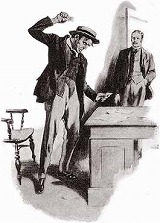“I assured him that the financial question did not arise. ‘No, of course, it is art for art’s sake with him,’ said he, ‘but even on the artistic side of crime he might have found something here to study. And human nature, Dr. Watson - the black ingratitude of it all! When did I ever refuse one of her requests? Was ever a woman so pampered? And that young man - he might have been my own son. He had the run of my house. And yet see how they have treated me! Oh, Dr. Watson, it is a dreadful, dreadful world!’
“That was the burden of his song for an hour or more. He had, it seems, no suspicion of an intrigue. They lived alone save for a woman who comes in by the day and leaves every evening at six. On that particular evening old Amberley, wishing to give his wife a treat, had taken two upper circle seats at the Haymarket Theatre. At the last moment she had complained of a headache and had refused to go. He had gone alone. There seemed to be no doubt about the fact, for he produced the unused ticket which he had taken for his wife.”
“That is remarkable - most remarkable,” said Holmes, whose interest in the case seemed to be rising. “Pray continue, Watson. I find your narrative most arresting. Did you personally examine this ticket? You did not, perchance, take the number?”
“It so happens that I did,” I answered with some pride. “It chanced to be my old school number, thirty-one, and so is stuck in my head.”
“Excellent, Watson! His seat, then, was either thirty or thirty-two.”
“Quite so,” I answered with some mystification. “And on B row.”
“That is most satisfactory. What else did he tell you?”
“He showed me his strong-room, as he called it. It really is a strong-room - like a bank - with iron door and shutter - burglar-proof, as he claimed. However, the woman seems to have had a duplicate key, and between them they had carried off some seven thousand pounds’ worth of cash and securities.”
“Securities! How could they dispose of those?”
“He said that he had given the police a list and that he hoped they would be unsaleable. He had got back from the theatre about midnight and found the place plundered, the door and window open, and the fugitives gone. There was no letter or message, nor has he heard a word since. He at once gave the alarm to the police.”
Holmes brooded for some minutes.
“You say he was painting. What was he painting?”
“Well, he was painting the passage. But he had already painted the door and woodwork of this room I spoke of.”
“Does it not strike you as a strange occupation in the circumstances?”
“ ‘One must do something to ease an aching heart.’ That was his own explanation. It was eccentric, no doubt, but he is clearly an eccentric man. He tore up one of his wife’s photographs in my presence - tore it up furiously in a tempest of passion. ‘I never wish to see her damned face again,’ he shrieked.”

“Anything more, Watson?”
“Yes, one thing which struck me more than anything else. I had driven to the Blackheath Station and had caught my train there when, just as it was starting, I saw a man dart into the carriage next to my own. You know that I have a quick eye for faces, Holmes. It was undoubtedly the tall, dark man whom I had addressed in the street. I saw him once more at London Bridge, and then I lost him in the crowd. But I am convinced that he was following me.”
“No doubt! No doubt!” said Holmes. “A tall, dark, heavily moustached man, you say, with gray-tinted sun-glasses?”
“Holmes, you are a wizard. I did not say so, but he had gray-tinted sun-glasses.”
“And a Masonic tie-pin?”
“Holmes!”